Bulletin Bottle offers a wide selection of water bottle materials. Each carries its own advantages and disadvantages. While it’s true that manufacturing and shipping custom water bottles has an impact on the environment, any of our material choices are far more environmentally friendly than the alternative: single use bottled water.
So, how do you know which water bottle material option is best for your custom water bottles? We’ve prepared this guide to help you in your decision! P.S. Since all Bulletin Bottle water bottles are BPA free, we have not featured that as a material advantage for any one option below.
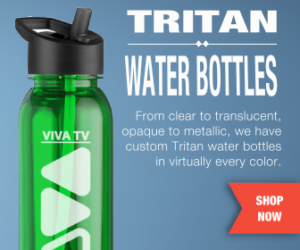 TRITAN COPOLYESTER is a relatively new material that was introduced to the market by Eastman in 2007. This ultra-tough option features high impact and heat resistance. It’s also leach proof, dishwasher safe, and resistant to odors, tastes, and stains. Our Tritan water bottles have a high perceived value and a low price point (when compared to materials like stainless steel and glass) and are our most popular material to date.
TRITAN COPOLYESTER is a relatively new material that was introduced to the market by Eastman in 2007. This ultra-tough option features high impact and heat resistance. It’s also leach proof, dishwasher safe, and resistant to odors, tastes, and stains. Our Tritan water bottles have a high perceived value and a low price point (when compared to materials like stainless steel and glass) and are our most popular material to date.
Advantages
• Dishwasher safe
• Odor and taste resistant
• Stainproof
• High value relative to price
• Many child-safe options
Disadvantages
• Sometimes lumped into the same category as lesser plastics
• More expensive than other plastics
• Not as pure as glass
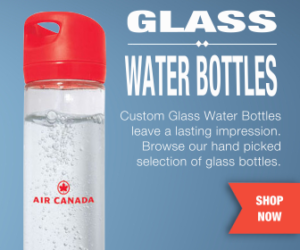 GLASS is seen by many as the most pure way to drink water. As such, it comes with a high price tag. Glass water bottles are not child safe, and often have limited print capabilities. Many of our glass water bottles feature silicone sleeves that are both stylish and act as extra protection for the bottle. Glass bottles are popular because the material has never contained BPA.
GLASS is seen by many as the most pure way to drink water. As such, it comes with a high price tag. Glass water bottles are not child safe, and often have limited print capabilities. Many of our glass water bottles feature silicone sleeves that are both stylish and act as extra protection for the bottle. Glass bottles are popular because the material has never contained BPA.
Advantages
• Water tastes the most pure
• High value
• Silicone sleeves add protection and trendy styling
• Dishwasher safe
Disadvantages
• Easily breakable
• Can be expensive
• Sometimes has limited imprinting capabilities
• Not safe for use by children
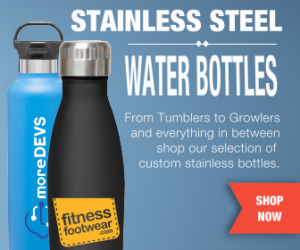 STAINLESS STEEL bottles are generally crafted from food-grade stainless steel. Since stainless steel is non-reactive, bottles made from this material don’t leach and don’t have to be lined. Since stainless steel contains nickel, people with allergies to this metal should avoid stainless steel water bottles. The highest quality metal bottles are almost always made from stainless steel.
STAINLESS STEEL bottles are generally crafted from food-grade stainless steel. Since stainless steel is non-reactive, bottles made from this material don’t leach and don’t have to be lined. Since stainless steel contains nickel, people with allergies to this metal should avoid stainless steel water bottles. The highest quality metal bottles are almost always made from stainless steel.
Advantages
• High perceived value
• Durable
• No plastic or epoxy
Disadvantages
• Can dent
• Possible faint metallic taste
• Heats up in warm temperatures
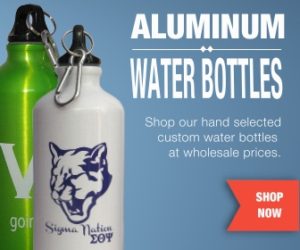 ALUMINUM bottles are lined–typically with an enamel, resin, polymer, or epoxy—because aluminum can react with certain liquids. Most factories will not disclose liner materials, citing confidentiality, but will test and affirm BPA-free, food-grade liners. Aluminum water bottles are lower-cost alternatives to stainless steel, and are popular options for metal water bottles.
ALUMINUM bottles are lined–typically with an enamel, resin, polymer, or epoxy—because aluminum can react with certain liquids. Most factories will not disclose liner materials, citing confidentiality, but will test and affirm BPA-free, food-grade liners. Aluminum water bottles are lower-cost alternatives to stainless steel, and are popular options for metal water bottles.
Advantages
• Lighter than stainless steel
• Less expensive than stainless steel
• Higher perceived value than plastic
Disadvantages
• Can dent more easily than stainless steel
• Has an enamel, resin, polymer, or epoxy lining
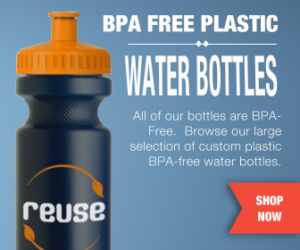 BPA-FREE PLASTIC is the most widely used material in inexpensive custom water bottles. There are many different variations of plastics, such as HDPE, PETE, polypropylene, and LDPE. The official names are long and twist on the tongue, but they’re all plastics. Tritan copolyester is also a part of this category. Some can be recycled, but this is entirely dependent on the recycling facility that receives the bottle. It should never be assumed that plastic bottles are automatically recyclable. Many BPA-free plastic water bottles are CPSIA approved for use by children, but this should never be assumed. Even when two bottles look identical, one may not have undergone the rigorous testing required to be CPSIA approved.
BPA-FREE PLASTIC is the most widely used material in inexpensive custom water bottles. There are many different variations of plastics, such as HDPE, PETE, polypropylene, and LDPE. The official names are long and twist on the tongue, but they’re all plastics. Tritan copolyester is also a part of this category. Some can be recycled, but this is entirely dependent on the recycling facility that receives the bottle. It should never be assumed that plastic bottles are automatically recyclable. Many BPA-free plastic water bottles are CPSIA approved for use by children, but this should never be assumed. Even when two bottles look identical, one may not have undergone the rigorous testing required to be CPSIA approved.
Advantages
• Lightweight material
• Relatively inexpensive with lots of color options
• Great for fundraisers
Disadvantages
• Not necessarily recyclable as many assume
• Not dishwasher safe, must be hand washed

TRUE!!!
A short yet complete description on knowing which material is the best for a reusable water bottle. I like how it simply explained each product without departing from the original topic. What a lovely read. Thanks for this!
That’s great! Thanks for letting us know 🙂 Hope you got an A!